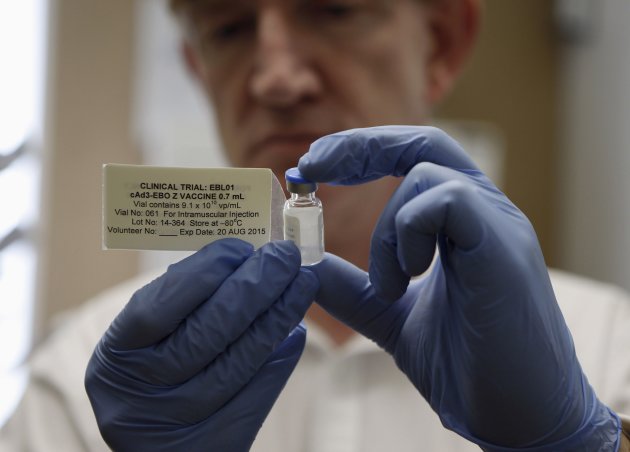
TORONTO - An experimental Ebola vaccine developed in Canada has been donated to the World Health Organization and will be shipped to Geneva next week. The WHO is finalizing the legal agreement needed for it to take possession of between 800 and 1,000 vials of donated vaccine. Once that contract is signed the vaccine will be shipped, a senior official told The Canadian Press.
"We are negotiating the final agreement and we should have it signed, I hope, by the beginning of next week. And we should be able to move the vaccine next week," said Dr. Marie-Paule Kieny, the WHO's assistant director general for health systems and innovation.Soon-to-start clinical trials will establish if the vaccine is safe to use in people and how much — or little — is needed to protect a person. It is hoped the results will show that a low dose can be used, which would mean each vial might contain up to 100 doses of vaccine. If Canada transfers 1,000 vials to the WHO and if 100 doses can be obtained from each vial, the Canadian donation could turn out to be 100,000 doses of vaccine. The studies may show each person will need two doses of vaccine to gain protection, a priming and a boosting dose.
Kieny said the vaccine was left in Winnipeg while plans were being worked out on who would conduct clinical trials of the experimental vaccine and where those trials would take place.
Until those plans were nearing completion, there was no need to have the vaccine in Geneva, Kieny said. The Winnipeg lab had the capacity to safely store the vials and the Geneva hospital that will hold the vaccine for the WHO had to purchase a special freezer to store it at -80 C. The vaccine, called VSV-EBOV, was created by scientists at the National Microbiology Laboratory.
Canada holds the intellectual property rights to the vaccine but has licensed the rights to a small American biotech company, NewLink Genetics, to be produced there. Based in Ames, Iowa, the company's primary focus — until recently — has been the development of cancer vaccines.
But because it holds the licence to one of a very few experimental Ebola vaccines — NewLink has found itself at the centre of a storm.
Scientists and others have questioned whether the company has the resources, finances and clout to push the vaccine forward. In an interview earlier this week, NewLink's vice-president of business development, Brian Wiley, said the company has been working as fast as it can.
"Our primary goal is to do this in the most accelerated, most ethical way possible to ensure the likelihood of success," Wiley said.
Meanwhile clinical trials of the another vaccine being tested in people have already started. That vaccine, called cAd3, was designed by scientists at the U.S. National Institute for Allergy and Infectious Diseases. In fact, investigators studying cAd3 started injecting the vaccine into volunteers — health-care workers and other health sector front-line workers — in Mali on Thursday. This is the first time a clinical trial of an Ebola drug or vaccine has been conducted in Africa.
The trial in Mali is a joint venture of the University of Maryland School of Medicine, the Center for Vaccine Development of Mali and the Ministry of Health of Mali.
Mali borders on Guinea — where the outbreak began late last year — making it a country at high risk of having cases. But to date it has not reported any.
NewLink's Wiley said five clinical trials of the VSV-EBOV vaccine will soon be under way in the United States (two), Germany, Switzerland and in an unnamed African country which is not battling Ebola. As well, Canada wants to conduct a clinical trial in it's home country.
This Ebola outbreak is the largest in history. The WHO is currently pegging the case count at 8,033 infections and 3,865 deaths. But it noted in a grimly worded report Wednesday that the ability to record accurate counts is declining, especially in Liberia. They are aware that hundreds, possibly thousands of cases have gone undocumented. Because the number of cases has far outstripped the capacity to care for the ill, infected people are being cared for — and in many cases, dying — in the community, not coming to the attention of authorities.
No comments:
Post a Comment
Through this ever open gate
None come too early
None too late
Thanks for dropping in ... the PICs